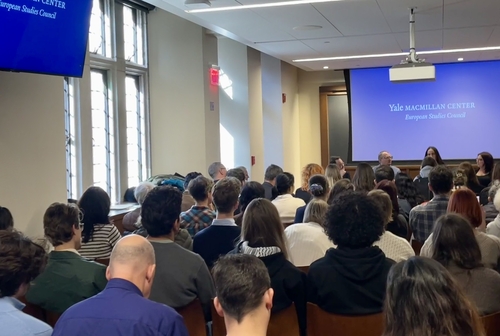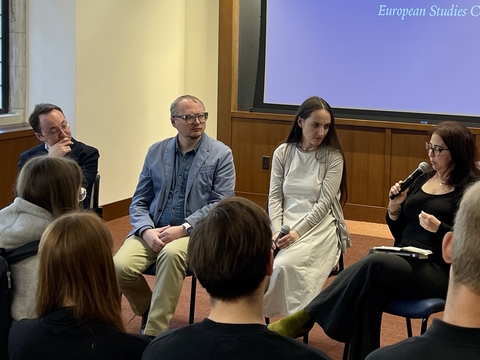
On Friday, November 3, 2023, as part of the European & Russian Studies Community Lunch Seminar series, the European Studies Council at the Yale MacMillan Center, The Poynter Fellowship in Journalism at Yale, and the Slavic Colloquium hosted Elena Kostyuchenko, a prize-winning Russian independent journalist and author. Marci Shore, Associate Professor of History (Yale) moderated a conversation with Andrei Kureichyk, a Belarusian dissident and writer in exile, and Nari Shelekpayev, Assistant Professor of Slavic Languages and Literatures (Yale). For the full videotaped recording of the event, HERE. “Opinions and statements expressed by event moderators and participants are their own personal views and do not represent the views of the university.”
Ms. Kostyuchenko reported on conflict, crime, human rights, and social issues for Novaya Gazeta for 17 years, until the newspaper was shut down under the pressure of Russian authorities in March 2022. Ms. Kostyuchenko was among the first to prove the presence of Russian troops in eastern Ukraine and covered the Russian invasion of Ukraine from the second day of the war. She now collaborates with the independent Russian exiled media Meduza. Her book, I Love Russia was recently published in October 2023.
The conversation began with a question from Mr. Kureichyk about the name of her book: “We are living in a time when a lot of people hate Russia […] What should be loved in today’s Russia?” Ms. Kostyuchenko responded, “It’s like to love your arm or leg, not many emotions about it, but if it hurts, it’s only one thing you can think of […] This love causes me a lot of pain, but it’s not like I’m willing to deny it, but to hide it, specifically because of Putin’s propaganda using love of Russia as an excuse for crimes. […] But the truth is that love doesn’t demand lies, murder, obedience; it demands a very precise look at what you love, and it demands responsibility, so I feel this responsibility, and this is how my love expresses.”
As a member of a disaster task force at Novaya Gazeta, Ms.Kostyuchenko used free time between disasters to write about people who had never been written about, “invisible communities” like “women recruited into prostitution, children living in an abandoned hospital or a woman who’s looking for the body of her husband who was killed in Donbas.” She went on to say, “I believe that to understand these people is actually more important than to understand Putin. Because Putin, after all, he’s just one lonely old man who going to die one way or another.”
Ms. Kostyuchenko then discussed the role of dehumanization in war and how media, literature, and art present false narratives of heroism that disguise its cruel reality: “a black hole which keeps gathering lives like a meat grinder.” She then described her experience in 2021 reporting on abuses in Russian PNI psychiatric homes, “a system of concentration camps for people with psychiatric and neurological disabilities,” and how this investigation led her to realize that Russia was a fascist state.
She then talked about her experience as an LGBTQ+ activist, and how even though she was fortunate to have a supportive family, being denied a mortgage with her long-time girlfriend and frustration with the state of LGBTQ+ activism in Russia at the time led her to speak out herself. Ms. Kostyuchenko also connected Russia’s anti-LGBTQ+ laws, particularly those against the transgender community, which make people “understand that their bodies, their lives belong to state,” to the dehumanization that enables Russia to “mobilize people and send them to kill other people.” She described how these policies support fascism by making LGBTQ+ people “inner enemies” in addition to Russia’s “external enemies like Europe and USA and Ukraine.”
After describing the extent of Russia’s “unprecedented” propaganda machine, Ms. Kostyuchenko shared her personal experience with the effects of propaganda: her own mother accused her of being a “traitor of the state” and having “sold our country to Europeans and Americans for money.”
The conversation concluded with a question from Dr. Shore about Ms. Kostyuchenko’s experience as a Russian journalist in Ukraine. Ms. Kostyuchenko responded by sharing how when she first crossed the border into Ukraine, Ukrainians helped her travel and willingly talked with her “not because they liked me, but because they saw me as a chance to address Russians.” Both the journalist and the people she interviewed “hoped that when we understand what’s happening, we would find a way and stop this war. That’s why we did it.”
The floor was then opened to questions from the audience. Topics included Russians abroad, how Russia can break a vicious cycle of denying responsibility, and the risks of investigative journalism in Russia.


